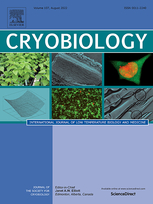
Effects of Hypothermosol, an experimental acellular solution for tissue preservation and cardiopulmonary bypass, on isolated newborn lamb coronary vessels subjected to ultra profound hypothermia and anoxia.
Author(s) : DAHDAH N. S., TAYLOR M. J., RUSSO P., et al.
Type of article: Article
Summary
Ultra profound hypothermia (4 to 10 °C) is an experimental method aiming at safely prolonging organ and total body preservation. For this purpose, Hypothermosol (HTS), an investigational acellular solution for blood substitution, was demonstrated to be beneficial in animal models undergoing cardiopulmonary bypass. The authors investigated the beneficial versus deleterious effects of cold preservation and the role of HTS on isolated coronary arteries (CA) during cold exposure, rewarming, and post-rewarming exposure to anoxia. Newborn lamb CA rings were studied using a tissue bath technique. CA were subjected to cold (7 °C for 3 hours) and treated with either Krebs' buffer (Krebs/ hypothermia) or HTS (HTS/hypothermia) (n= 15 each). A third group maintained at 37 °C (Krebs/ normothermia) (n= 18) served as a time control. This study demonstrated that ultra profound hypothermia promotes coronary vasoconstriction upon rewarming, which is detrimental to relaxant response to hypoxia. Both phenomena are alleviated by performing ultra profound hypothermia under HTS protection.
Details
- Original title: Effects of Hypothermosol, an experimental acellular solution for tissue preservation and cardiopulmonary bypass, on isolated newborn lamb coronary vessels subjected to ultra profound hypothermia and anoxia.
- Record ID : 2000-2228
- Languages: English
- Source: Cryobiology - vol. 39 - n. 1
- Publication date: 1999/08
Links
See other articles in this issue (3)
See the source
Indexing
- Themes: The influence of refrigeration on cells, tissues and organs
- Keywords: Cryobiology; Tissue; Blood system; Lung; Hypothermia; Cryopreservation; Heart
-
Culture of graft-infiltrating cells from cryopr...
- Author(s) : PATIJN G. A., VAESSEN L. M. B., WEIMAR W., CLAAS F. H. J., JUTTE N. H. P. M.
- Date : 1996/08
- Languages : English
- Source: Cryobiology - vol. 33 - n. 4
View record
-
RETENTION OF ENDOTHELIUM-DEPENDENT VASODILATORY...
- Author(s) : KU D. D., WILLIS W. L., CAULFIELD J. B.
- Date : 1990
- Languages : English
- Source: Cryobiology - vol. 27 - n. 5
View record
-
Cryopreservation of vascular endothelial cells ...
- Author(s) : PEGG D. E.
- Date : 2002/02
- Languages : English
- Source: Cryobiology - vol. 44 - n. 1
View record
-
Cryopreservation of the common carotid artery o...
- Author(s) : SONG Y. C., HUNT C. J., PEGG D. E.
- Date : 1994/08
- Languages : English
- Source: Cryobiology - vol. 31 - n. 4
View record
-
Proteoglycan content in fresh and cryopreserved...
- Author(s) : SHON Y. H., WOLFINBARGER L. Jr
- Date : 1994/04
- Languages : English
- Source: Cryobiology - vol. 31 - n. 2
View record
